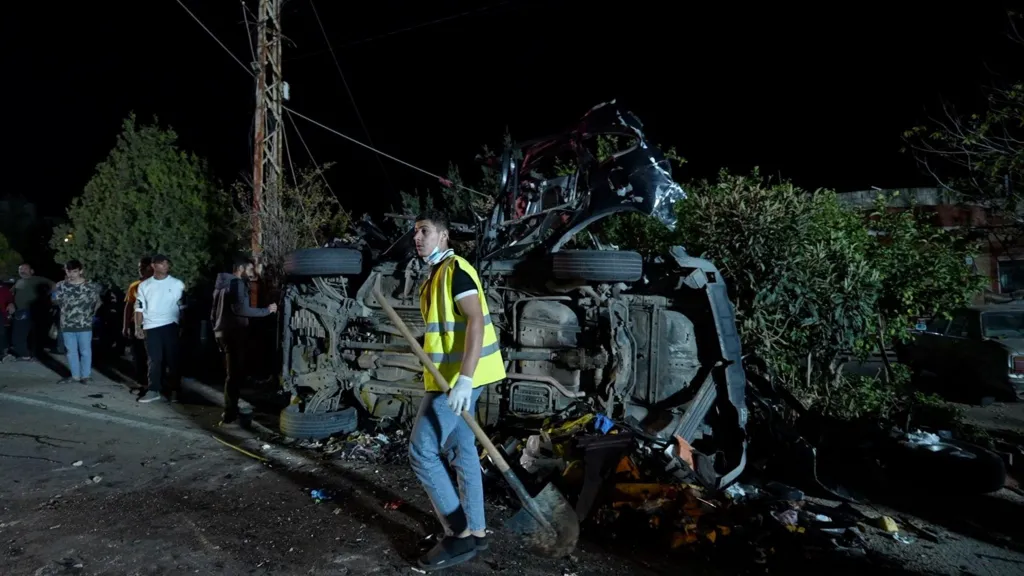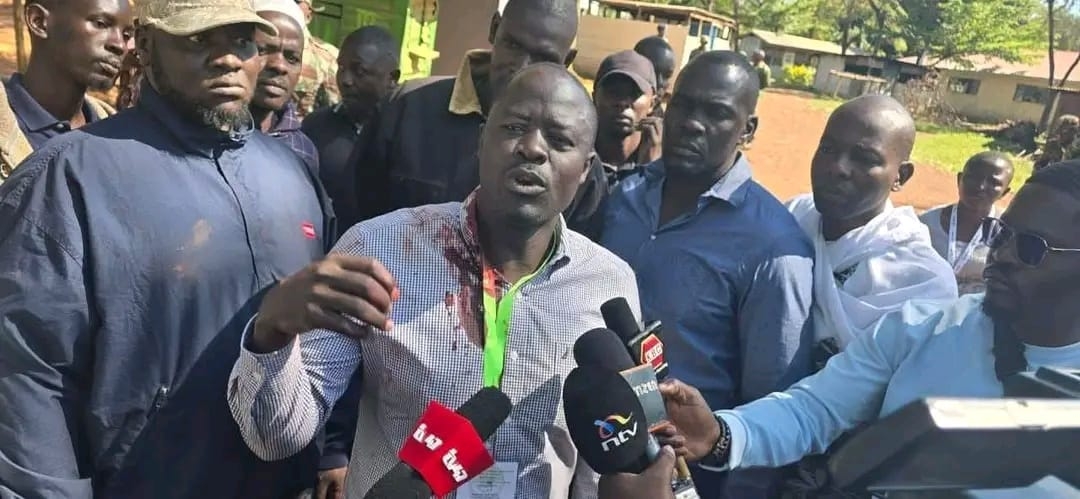
Last Friday, at around 19:00, an Israeli air strike hit a car in a village in southern Lebanon called Froun. This part of the country is the heartland of the Shia Muslim community, and for decades has been under the sway of Hezbollah, the Lebanese Shia militia and political party. On streets, banners with the faces of fighters killed in battle hang from lamp-posts, celebrating them as "martyrs of the resistance".
I arrived in Froun an hour after the strike. Rescue workers had already removed the body parts of the only casualty - a man who was later described as a "Hezbollah terrorist" by the Israeli military. Despite a ceasefire deal that came into force last November, ending the latest war with Hezbollah, Israel has continued with its bombing, almost every day.
"Who is going to help us?" one resident, Mohamad Mokdad, asked me. The car had been hit as it passed in front of his house, and he was still cleaning up the veranda. "There were body parts here and in the trees." He sounded despondent.
"We're against all this... I just want to live in peace. I don't want parties," he said. He did not mention Hezbollah - which means "Party of God" - by name, but that is probably what he meant. "I don't want anyone."
Israel says it is targeting Hezbollah and the group's efforts to recover after being severely weakened in the war. I travelled to southern Lebanon to see the impact of the Israeli campaign, and saw that the attacks had shattered people's sense of security and even some long-held views in areas where Hezbollah has traditionally enjoyed widespread support.
The ceasefire in Lebanon ended 13 months of war that killed 4,000 Lebanese and 120 Israelis. Israel and Hezbollah have been fighting for decades, and this conflict started when Hezbollah began firing rockets and missiles at Israeli positions a day after Israel launched its massive military response to the Hamas-led attacks on 7 October 2023.
The truce, brokered by the US and France, required Hezbollah to remove its fighters and weapons from the south of the Litani river, about 30km (20 miles) from the border with Israel, and Israeli troops to withdraw from areas of southern Lebanon that they invaded during the war. Thousands of Lebanese soldiers would then be sent to areas that had been effectively under Hezbollah control.
A year later, the Israeli military continues to occupy at least five hilltops in southern Lebanon and has carried out air and drone attacks across the country on targets it claims are linked to Hezbollah. Last Sunday, it killed the group's chief of staff and four others in a strike on a building in the Dahieh district, outside Beirut.
Unifil, the United Nations peacekeeping force in Lebanon that operates south of the Litani, says Israel has committed more than 10,000 air and ground violations during the ceasefire. According to the Lebanese health ministry, more than 330 people have been killed in Israeli attacks, including civilians.
Israeli officials say Hezbollah has been working to rebuild its military capabilities south of the Litani, which would be a violation of the ceasefire, and also tried to smuggle weapons into Lebanon while ramping up the production of explosive drones as an alternative to rockets and missiles.
So far, Israel has not made the evidence it says it has public. But, for weeks, Israeli journalists have been briefed on plans for a possible escalation against the group. "Hezbollah is playing with fire, and the president of Lebanon is dragging his feet," Israel Katz, the Israeli defence minister, said recently.
Joseph Aoun, the Lebanese president, came to power in January promising a "state monopoly on arms" - in other words, to disarm Hezbollah. The group is considered a terrorist organisation by countries including the UK and the US. But in Lebanon, Hezbollah is more than a militia. Despite the recent blows, it remains a powerful political party with representation in the government and parliament, and a significant social movement, providing services in areas where the state is absent.
A Unifil spokesperson told me they had not observed any military activity by Hezbollah or attempts to rebuild infrastructure. Hezbollah, too, rejects the Israeli allegations and says the terms of the ceasefire deal only apply to south of the Litani. There, it has not opposed the Lebanese army's operations against its arsenal.
The group has not fired on Israel since the truce came into force, although it did launch several mortars that hit an Israeli army base in the disputed Mount Dov/Shebaa Farms area in the occupied Golan Heights in December, in response to what it said were repeated Israeli violations.
Last week, Lt Col Avichay Adraee, the Arabic spokesman for the Israeli army, published on social media a warning for the Lebanese village of Beit Lif: Israel had detected "dozens of terrorist infrastructures" belonging to Hezbollah, and would act to remove any threat. Worried that an attack could be imminent, residents made a public appeal, late at night, for Lebanese soldiers to be deployed.
I visited Beit Lif the following morning. (To travel to southern Lebanon, we had to inform Hezbollah's media office in Beirut; the group did not interfere in our reporting.) The village had a pre-war population of around 8,000; now, less than a third remains.
The local imam, a 63-year-old man who did not want to have his name published, told me the Lebanese soldiers had arrived with Unifil troops, patrolled the streets and left after about five hours, before dawn. The Lebanese military has refused to inspect private properties, possibly in order not to be seen to be collaborating with Israel; in Beit Lif too, the imam said, they did not enter any houses.
As we spoke, half a dozen men gathered around us on the grounds of a mosque that had been destroyed in an Israeli air strike during the war. Quietly, one of them told me: "Hezbollah needs to decide: it either responds to Israel or accepts defeat, disarms and let us move on with our lives. This can't continue."
Public criticism of Hezbollah is still rare but, exhausted, some appear to be questioning the old consensus. We then heard a distant sound – from Israeli fighter jets in the sky.
One of the locations that appeared to have been highlighted in Col Adraee's message was a house in front of the municipality building. Israel has frequently accused Hezbollah of embedding its arsenal in civilian areas, an allegation I had also heard from some residents during the war.
Ezzat Hammoud, the Beit Lif mayor, told me: "No, no, no. There are no militants or weapons here. I can be held responsible for what I'm saying." So why, if that was the case, had his village attracted the attention of the Israeli military? "Either to terrify the residents and force them to move," he said, "or to put pressure on the Lebanese army to confront people."
A man called Haider, whose family owned the house, insisted on taking me to visit it. Outside, a poster remembered his brother, a Hezbollah fighter, who had been killed in the war. Haider said he wanted to prove there was nothing wrong there, appearing to believe that by being in the media he would, somehow, be protected. "You can enter room by room and check with your own eyes," he said. It is difficult for us to confirm what could be happening here. He later said: "We want stability, we don't want war, or anything related to it."
Just months ago, it would have been almost impossible to have a conversation like this or even talk to people without being approached by Hezbollah members. Haider complained about how unsafe he felt, and I asked him what Hezbollah should do. He did not give me a straight answer but said: "We're done. We're worn out."
Despite the warning, Israel has not attacked the village.
In a televised speech earlier this month, Naim Qassem, Hezbollah's secretary general, addressed the issue of Israel's continued attacks, warning that "everything has a limit". He said the group would "never" surrender its weapons, which he called the "source of its strength". "The enemy," Qassem said, referring to Israel and the United States, "wants to erase our life and our existence, but we'll remain steadfast. We'll either live with dignity or die with dignity."
Hezbollah's arsenal, more powerful than that of the country's own army, has long divided the Lebanese. Opponents accuse Hezbollah of dragging Lebanon into wars and of defending the interests of the group's main backer, Iran. They see this as a unique opportunity to disarm it. But President Aoun, who is a former army chief, has refused to use force against Hezbollah, saying this could exacerbate sectarian divisions and lead to a civil war. If the authorities were not careful, Aoun said in April, "we'll lead Lebanon to ruin".
A Western diplomat familiar with the discussions told me the Lebanese authorities were under increasing pressure from the Trump administration, which was frustrated with the pace of the efforts and supported Israel's actions in Lebanon. "Some are seeing this as the 'Lebanese way' of doing things," the diplomat said about the disarmament plans, and "aren't convinced" it can work.
The army is expected to announce it has completed the disarmament of the group in the areas south of the Litani next month. The army, an intelligence officer told me, would then turn its attention to other parts of the country - Hezbollah's presence is also significant in the Dahieh and the eastern Bekaa Valley. This will be a more challenging, and risky, mission without the group's consent, and there is no timeline for that.
I drove on to the border village of Yaroun. From there, I could see a concrete wall that Israeli soldiers had recently built inside Lebanon. The authorities say this is another Israeli violation of the ceasefire agreement, and a breach of the country's sovereignty.
Lebanese communities along the frontier are still in ruins - Lebanon's international partners have so far refused to fund reconstruction, in part because of the impasse over Hezbollah's disarmament - with the Israeli military enforcing a de facto buffer zone. Tens of thousands of Lebanese remain displaced, without knowing when - or if - they will be able to return.
In Yaroun's square, a billboard with a picture of the late Hezbollah leader, Hassan Nasrallah, killed in an Israeli air strike in the Dahieh when the conflict escalated last year, remained largely intact.
A few metres away, I saw a man outside one of the few standing houses. Nayef al-Rida had moved there with his wife and an elderly relative. We could hear the constant sound of an Israeli drone, circling overhead.
"This happens 24/7," he said. I wondered how he felt living there. "We've got every reason to be afraid," Mr Rida said. "There's no-one here. You'll leave in a bit, and we'll be left alone."
A worn-out Hezbollah flag was hanging from a tree near his house. He said he was not confident that the group would give up its weapons. I asked him what he thought would happen. "We wait for God's mercy," he said. "This is no life."














